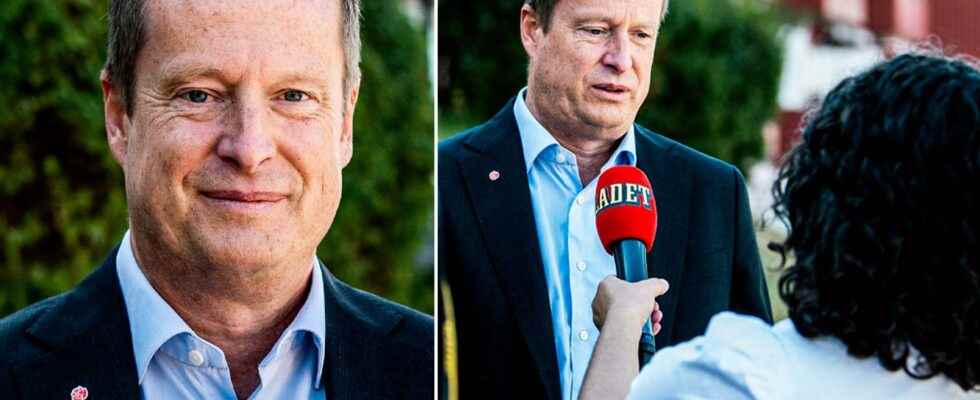Published: Less than 30 min ago
Updated: Just now
It is bad to have residential areas where the majority have non-Nordic origins, Anders Ygeman (S) said in a DN interview that sparked debate.
But he rejects criticism that the statement is racist.
– It’s just bullshit, says the integration minister to Aftonbladet.
Anders Ygeman, Minister of Migration and Integration, wants to see clearer criteria in what the police class as particularly vulnerable areas, he recently told in an interview with Dagens Nyheter.
In addition to criteria such as criminality, educational background and socio-economic factors, he is also open to the proportion of residents with a non-Nordic background being a criterion.
– I think it is bad to have areas where the majority have non-Nordic origins, he said in the interview, which was criticized by both The Center Party’s Annie Lööf, The Green Party’s Märta Stenevi as a social democratic municipal councillor, interviewed in DN.
The Left Party’s former party leader Lars Ohly wrote on Twitter : “So speaks a racist”, and linked to the interview.
“Is there an ethnic dimension”
“Trams”, says Ygeman about it when Aftonbladet meets him at a neighborhood collaboration on integration in Akalla, in northern Stockholm. Very close by are Rinkeby and Husby, two areas that the police have classified as particularly vulnerable.
– I think it is regrettable that the debate ends up there and is not about what we should do to break segregation, he clarifies.
Can you understand those who think you strike a racist tone?
– No, I actually can’t, because then you haven’t read what I say in the article. What I am saying is that criminality, class and socio-economic background are more important but that I cannot completely deny that there is an ethnic dimension to this.
– If we have residential areas where 60, 70, 80 or 90 percent have a non-European background, then it will be more difficult for the children at school. We have preschools where almost no parent has Swedish as their mother tongue, this affects the children’s situation. It will be more difficult to learn Swedish, more difficult to enter Swedish society, more difficult to get jobs and contacts that are needed. Therefore, it is natural that you have to include it when you talk about segregation.
Isn’t this a way of dividing people into compartments?
– No, on the other hand, it is a way to discuss how we should break the division we have in Swedish society. We have a segregation, it is partly ethnic, that is what I want to break.
– If you don’t pretend about the problem, you won’t be able to solve it either.
Not a “trial balloon”
Political scientist Jonas Hinnfors, who has researched social democracy and integration policy, states in an interview with Swedish Radio that the Social Democrats previously most often explained integration problems with factors such as class, poverty, and inequality.
– That you deviate from that and go into ethnicity as an explanatory factor regarding integration problems is a little surprising, he says.
Hinnfors believes that the statement may be a so-called “trial balloon”, an expression of when a party or a politician uses new words in order to later redirect policy.
Ygeman denies that.
Don’t want to forcibly relocate people
– I answered interview questions I received, just as I do now. I think the political conversation is best if you are open and honest and try to answer questions to the best of your ability.
There are also those who wonder if this is a way to attract other parties’ voters?
– Absolutely not. We have had 30 years of growing divides in Sweden, we have had a segregation that robs people of life chances, we must break it. Then we also have to be able to talk about things that are difficult.
How should a proposal like this be implemented in concrete terms? Should people be forcibly relocated?
– Of course you shouldn’t do that. The most important thing is that you have people with you, if you are going to reshape an area, the most important thing is that those who live in the area are involved.
“Not so keen”
Ygeman also addresses measures that the party wants to implement in the Riksdag, such as dismantling the so-called ebo law. The Act on own accommodation, as it is actually called, means that an asylum seeker who comes to Sweden can choose to arrange their accommodation on their own instead of living in the Migration Agency’s facility accommodation.
– Knocking down the ebo legislation means that we will not fill vulnerable areas with even more people who lack their own support and are new arrivals, he says.
He reasons that a priority for people who are studying or have a job, at the same time as an investment in more police and better schools and preschools, should both attract more people to particularly vulnerable areas, but also lift them from the classification.
Could you yourself move to a particularly vulnerable area to contribute to the loosening of the segregation you speak of?
– I grew up on the ninth floor of a concrete house in Hagsätra, now I live in Årsta. I think that my attitude is similar to that of most people, that in the first place you are not so keen to move to an area that is particularly exposed. That is why we have to break that vulnerability so that more people like me who are quite well off are prepared to move to such areas.
